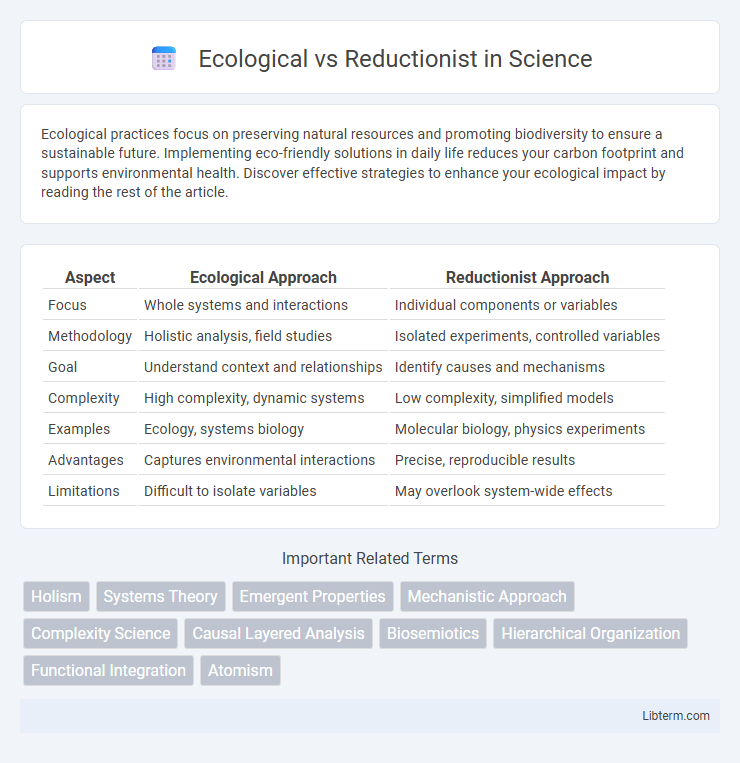Ecological practices focus on preserving natural resources and promoting biodiversity to ensure a sustainable future. Implementing eco-friendly solutions in daily life reduces your carbon footprint and supports environmental health. Discover effective strategies to enhance your ecological impact by reading the rest of the article.
Table of Comparison
| Aspect | Ecological Approach | Reductionist Approach |
|---|---|---|
| Focus | Whole systems and interactions | Individual components or variables |
| Methodology | Holistic analysis, field studies | Isolated experiments, controlled variables |
| Goal | Understand context and relationships | Identify causes and mechanisms |
| Complexity | High complexity, dynamic systems | Low complexity, simplified models |
| Examples | Ecology, systems biology | Molecular biology, physics experiments |
| Advantages | Captures environmental interactions | Precise, reproducible results |
| Limitations | Difficult to isolate variables | May overlook system-wide effects |
Defining the Ecological Approach
The ecological approach emphasizes understanding organisms within the context of their environments, highlighting the dynamic interactions between living beings and their surroundings. It prioritizes holistic analysis, considering systems as integrated wholes rather than isolated parts, contrasting with reductionist methods that dissect elements into simpler components. This perspective is crucial in fields like environmental science and psychology, where the interplay of multiple factors shapes behavior and outcomes.
Understanding the Reductionist Perspective
The reductionist perspective analyzes complex ecological systems by breaking them down into their individual components, emphasizing the role of isolated variables and linear cause-effect relationships. This approach facilitates detailed examination of specific processes, such as nutrient cycles or species interactions, by simplifying the system into manageable parts. While effective for targeted studies, it often overlooks emergent properties and holistic ecosystem dynamics critical for comprehensive ecological understanding.
Historical Origins of Both Models
The ecological model emerged from early 20th-century social sciences, notably influenced by Urie Bronfenbrenner's work on human development within layered environmental systems. The reductionist model finds its roots in classical scientific approaches dating back to Rene Descartes and Isaac Newton, emphasizing breaking down complex phenomena into simpler components for analysis. Both models represent contrasting paradigms: ecological focusing on interconnectedness and context, while reductionist prioritizes isolated cause-and-effect mechanisms.
Key Differences Between Ecological and Reductionist Views
Ecological views emphasize the interconnectedness of organisms and their environments, highlighting complex interactions within ecosystems. Reductionist approaches break down systems into individual components, focusing on isolated variables to understand biological functions. Key differences include holistic integration in ecological perspectives versus the segmented analysis in reductionist methodologies.
Strengths of the Ecological Approach
The ecological approach excels in capturing the complex interactions between organisms and their environments, providing a holistic understanding of behavior and development. It emphasizes context, considering multiple levels of influence from individual to societal factors, which enhances the relevance and applicability of findings in real-world settings. This approach supports sustainable solutions by integrating biological, social, and environmental perspectives, promoting adaptive and resilient systems.
Limitations of Reductionism
Reductionism often fails to capture the complexity of ecological systems by oversimplifying interactions into isolated components, ignoring emergent properties that arise from holistic relationships. This approach can lead to incomplete or misleading conclusions about ecosystem dynamics, biodiversity, and interdependence among species. Ecological studies emphasize system-level processes and feedback loops that reductionism inherently cannot address, highlighting its limitation in explaining real-world environmental phenomena.
Applications in Psychological Research
Ecological approaches in psychological research emphasize studying behavior in naturalistic settings, promoting validity and real-world applicability by capturing complex interactions within environmental contexts. Reductionist methods isolate specific variables or processes in controlled environments, facilitating precise measurement and causal inference but often sacrificing ecological validity. Integrating both approaches enhances psychological research by balancing experimental control with relevance to everyday human experiences, particularly in areas like cognitive neuroscience and developmental psychology.
Impacts on Environmental Science
Ecological approaches in environmental science emphasize the complex interactions and interdependencies within ecosystems, facilitating holistic understanding and sustainable management of natural resources. Reductionist methods isolate specific elements or processes, enabling detailed analysis but often overlooking system-wide effects and feedback loops. The integration of ecological perspectives enhances predictive accuracy and fosters effective conservation strategies, while reliance solely on reductionist models risks underestimating biodiversity loss and ecosystem resilience.
Integrating Both Perspectives
Integrating ecological and reductionist perspectives enhances understanding by combining holistic environmental interactions with detailed component analysis. This approach leverages ecological systems' complexity while using reductionist methods to identify specific causal mechanisms and biochemical processes. Bridging these methodologies fosters comprehensive solutions for sustainability, ecosystem management, and biodiversity conservation.
Future Trends and Implications
Future trends in ecological approaches emphasize holistic understanding and integration of complex environmental systems, promoting sustainability and resilience in natural resource management. Reductionist methods focus on isolating specific components to develop targeted technological innovations, enabling precise interventions in ecosystems and human health. Integrating both perspectives creates hybrid models that enhance predictive accuracy and adaptive strategies, crucial for addressing climate change and biodiversity loss.
Ecological Infographic

 libterm.com
libterm.com